
Diego Rivera (panal for MoMA).
“Terrorism is the marketing of the fear commodity.”
Geoffrey R. Skoll
“Even the dead will not be safe from the enemy if he wins.”
Walter Benjamin
“I do not understand the squeamishness about the use of gas. I am strongly in favor of using poisoned gas against any uncivilized tribes…””
Winston Churchill
1920, speech in Parliament
Max Forte, in an essay on the New Victorianism, noted the intellectual developments that began in this era (1837 – 1901)…
“Racial theories, “scientific racism”;
Photographic realism (Hewitt, 2006, p. 412);
A “Victorian New World Order” (Young, 2009), compressing representations of the imperial-dominated globe in events such as the Great Exhibition of 1851;
Globalism, as we now call it, ushered in then by the telegraph and railways, “annihilating time and space” (in the language of the time);
Cosmopolitanism, in literature, philosophy, and styles of living (including the advent of tourism);
Imperialism, as a political term and as focus of theories of political economy;
The “working class” (Hewitt, 2006, p. 399) appeared as a concept, along with socialist philosophies;
Evolutionism and its discourse of “progress” and the ideologies of progressivism it spawned;
The prestige of scientific elites and the development of a technocratic class;
The “avalanche of numbers” as Thomas Kuhn called it, appearing from around 1840, with all the censuses, statistics, classification, coding, documentation, registration, creation of police forces and philanthropic inspection (Hewitt, 2006, p. 417);
The “problem of order” and the elites’ fear of the masses;
The social sciences (anthropology, sociology, economics, political science, history) were first instituted in this period; and,
Even scientific detective stories (where forensic analysis was crucial), plus science-fiction stories, and horror, were each established as popular genre in Britain’s 19th century.”

Mathew Lipps
The turn of the 20th century (well, a bit before) marked the real popularizing of Eugenics. Stefan Kuhn, writing about the father of the modern Eugenics movement, Francis Galton:
“Born in 1822, Galton was so much a product of Victorian Great Britain that he
originally wanted to restrict the activist circle of eugenics to Great Britain. Someone
whose accomplishments included being among those who discovered the uniqueness
of fingerprints, he also made a name for himself as the inventor of correlation
coefficients in statistics, the originator of systematic meteorology, and the founder
of research on twins…{} In opposition to the prevailing scientific notions of his time, Galton developed
his theory in the 1860s that talent and character are primarily inherited. The effect
of the environment was said to play only a secondary role in the mental development of human beings.
Galton used the index Dictionary of Men of the Time, a kind of
nineteenth-century Who’s Who, to show that the overwhelming majority of well known
British scientists, poets, writers, lawyers, musicians, politicians, and generals
were related by blood.”

Birthe Piontek, photography.
The British Empire, which was periodically the third phase of colonial conquest for Britain that began in the late 1600s, is roughly defined as 1815 to 1914. Neil Faulkner writes…
“During the mid 19th century, the spread of industrial capitalism across much of Europe had created a fast-growing demand for primary products, new markets, and outlets for the investment of surplus capital. A financial crash in 1873 and a global slump thereafter had intensified competition among European capitalists. In consequence, between 1879 and 1913, virtually the whole of Africa was carved into colonies by the European powers.”
In the shadow of the political conventions now, mercifully, ended, I think it is worth looking at the fractured collective psyche of the U.S. public today. The further banalization of what was already banal does cause the mind to reel a bit. The post modern imagination, then, is the product of both media and its attendant propaganda apparatus, but also (and this becomes ever more clear) a collective regression to something akin to tribal pre modern socities. Geoffrey R. Skoll, in a very good book on contemporary forms of fear mongering writes…
“The bombs at the end of the Boston Marathon on April 15, 2013 (suddenly
renamed Patriot’s Day from its former rubric, Tax Day) could not be pinned
on al Qaeda, but at least the preconvicted suspects, Dzhokhar and Tamerlan
Tsarnaev came from Muslim backgrounds in Chechnya. Despite valiant
efforts, only one of them, Tamerlan, was killed trying to escape; the other
brother, Dzhokhar, was severely wounded, but unfortunately survived and
faced a sentencing appearance in court (facetiously called a trial) sometime in
2015. Unsurprisingly, he was sentenced to death with the additional proviso
that he be kept incommunicado until the coup de grace (Turner 2015). The
unity of the narrative had to be preserved at all costs (Baker 2014). The uni-
fied narrative is that the forces of the global empire’s repressive apparatus—
led by the US military, police, and intelligence agencies—invade, murder,
surveil and otherwise control, contain, and dispose of its adversaries, especially
those who might inhabit strategic territories with desirable resources.”
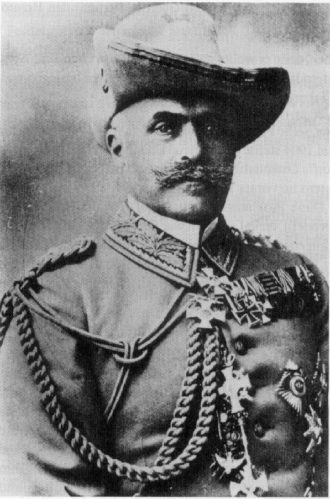
Lothar Von Trotha
The Boston Marathon attack has always felt like a kind of trial balloon for domestic policing and surveillance expansion. And for the implementation of martial law. A city got shut down for two men. TWO. And it marked the first execution of a suspect in what is now a long series of executions by domestic police (the most recent was the Dallas suspected cop killer who was topped off by drone murder).
The point though, for the purposes of this post, is to explore the new consciousness of post modern America. And I am always concerned with an aesthetic aspect of this stuff because I think it is both neglected and also highly important if one is going to understand the class and cultural divides in the U.S. right now. Skoll notes that contemporary terrorism is a kind of folk tale around which mythology has grown.
“The post-1980 folktale of terrorism is part of a mythology that provides
an ideological background for the global empire and the world ruling class.”
Geoffrey R. Skoll
The ritual establishing of the terrorist act needs the imprimatur of authority. And that stamping of the event as an *act of terror* must occur quickly ( as in 9/11 right up to Charlie Hebdo shooting and the Boston Marathon). The ritual has no meaning, however, if it is not linked to larger evil. Global evil. For this is a theology of fear. The lone gunman trope is reserved for white guys on anti depressants. Then comes the kitsch phase of mourning. Candlelight vigils, flowers laid at the scene, etc. And usually celebrity tears are given attention by media, as well. For the media are the ones directing this scenario. There is a crucial detail here, though, that Skoll notes and which I have written about on this site several times. And that is the use of *non places*. The post modern non space. Airports, train terminals, roadway underpasses, etc. Public space for everyone, and yet for nobody (per Skoll). They are amorphous and hence valuable in their plasticity for service in various roles of the mythology. The hero of this fairy tale is the Empire. And in this sense it is the recuperation of the colonial empire. For one of the tropes in terror narratives is vengeance. The terrorists as arrested suspect is far too ambivalent and confusing a dramatic personae. The terrorist must be eliminated.

Ned Vena
“Sir Frederick Lugard, British High Commissioner for the Protectorate of Northern Nigeria, insisted on ‘annihiliation’ in response to a peasant revolt in 1906. Around 2,000 African villagers armed with hoes and hatchets were shot down by soldiers using magazine rifles. Prisoners were executed and their heads cut off and put on spikes. The rebel village was razed to the ground.
Tens of thousands of Herero and Nama tribespeople died of starvation and thirst when the Germans drove them into the Namibian desert between 1904 and 1907. General Lothar von Trotha, like Lugard, was an explicit advocate of ‘annihilation’.”
Neil Faulkner
Dead terrorists are the only useful prop for the dark side cast of this drama. Skoll also notes that collective repression functions much like Freudian individual repression. Ideas must be kept buried. And if there is ever a better example of this it is the current political circus around Hillary and Trump. In the last posting here I noted the phantasmic properties Marx saw in commodities. These magical objects are useful in the construction of the terror narrative, as well as in all political *events*. Skoll also points out the need for the constant repetition of the imagery of the event. And this is, I think, something I have written on several times. The compulsive need for repetition. A repetition that nullifies and ends in Death. Annihilation.
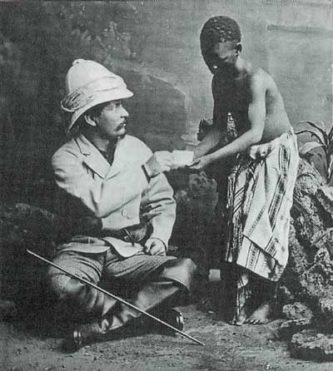
Stanley Henry Morton
All of this lay in the shadow of colonial history and Eugenics. For the terrorist is the new savage, the new uncontrollable native barbarian. This also dovetails with the making of the disobedient into terrorists. As Skoll notes, the most victimized make the best terrorists. As Native Americans were being genocidally eliminated, the representations of *Indians* grew in monstrousness. There are almost no Hollywood products today that do not feature evil Muslim masterminds. And, at the same time, white saviors (Matt Damon, arch liberal, and his new white savior vehicles The Great Wall). There are always several layers of meaning in these depictions of *terrorist evil* One is the physical threat, but there are also more metaphorical aspects like lack of cleanliness and lack of self control (lack of civilized restraint…sexual).
The current electoral narrative in the U.S. is rife with the shadows of lurking terror. And with that comes the normalizing of a culture of securitization and control. Trump, of course, has zero chance to win. The machinery of the Clinton mafia has been in play since Bill was president. For the public today live, regardless of class, actually, in landscapes of pacification and surveillance. But for such landscapes to work there needs to be a fair amount of *non space* at hand. And non space, as such, is both fluid and temporary, and also imbued with a sense of ritualistic resonance. The securitized landscape also exists subjectively. The Empire desires control of the periphery, but such control entails phases of chaos. The chaos, however, does not effect resource control, per se. And it does not matter anyway, so long as Western capital can operate in some form throughout all the phases of pacification. The subjective mechanisms of control are mostly directed at the bourgeoisie. The poor are simply disposable props. The black and latino poor, media makes sure, are associated with this new terrorist trope.

Lisa Oppenheim
And the bourgeois psyche is today is one that functions in total decontextualization. Skoll notes that predictability is essential to Capital. And this is the hidden, or not so hidden meaning of the recently completed conventions. It doesn’t really matter who wins, not to the ruling class. For whoever won would be subject to the prep-existing structural controls of the system. The fact that Hillary is the MOST predictable candidate is just a bonus. She already knows the drill, and in fact helped write some of the latest adjustments to it. What matters to those who own the system is that they can predict their economic future. A given in that prediction is social domination. And as the environment worsens (a bit unpredictable, that) the apparatuses of control go into overdrive. For the bourgeoisie this is all invisible. What matters to them is their own aesthetic and social predictability. Their children can continue at expensive private schools, their tee time is not interrupted, and their favorite celebrity gossip continues to be readily available. And, most importantly, their decontextualized personal sphere suffers no intrusion from the unpleasant cognitive dissonance of the masses. Not even images or stories of the masses, unless shot through the prism of corporate neutralization.
“Efficiency has acquired the aura of a rational value, a desired goal of management.
It has nothing to do with human realization. Often it is inhumane.
Efficiency is a substitute for social relations, and capital elevates efficiency to
a supreme value in its self-aggrandizement.”
Geoffrey R. Skoll

Sara Van Der Beek, photography.
Efficiency is another aspect of risk management. And of pacification. And it is here that a certain element of mythology or folk tale intercedes. While it is true that Imperialist aggressions by the U.S. and its organ of disorder NATO, appear inefficient, they are only so in terms of traditional logic. For the *lost* money, spent on wars, is not the money of the ruling 1%. It is the money of masses, and it is not even that, really. It is a kind of mythic money. One thing that is, in fact, concrete, is the profit made from these wars. And that is why they are fought. But the bourgeois class, again, has no context with which to process this narrative. The only fragment of story they have is the fairy tale where good and evil plays roles. But so impoverished is the contemporary imagination that these fragments, memes really, float in a kind of digital haze, flickering across the screens of a million lap tops every second. There is very close to zero historical perspective, or even set dressing involved. For this is a culture of amnesia. Most people can barely remember who was President three elections back. And most can’t really tell you who the Secretary of Defense is now, or who runs the CIA. The official narrative of the U.S. government is barely a narrative at all, anymore. The *War on Terror* has been abridged and is now just a permanent state of militarism and annihilation. Drones are sent out and they deliver vast amounts of ordnance and vast numbers of poor civilians die. There is no logic and no threat. But this is transformed in Hollywood’s infantile narratives into a mythic clash of civilizations. Some of the killing serves the purposes of destabilizing various areas that are seen to harbor potential future uprisings (meaning some group might come to power unfriendly to the U.S. empire). The bourgeoisie love identity causes — which is part of this fractal of decontexualization in which they live — and so the gay community in the U.S. will vote for Hillary because her optics and policy support tolerance for gays. Although in reality it does very little for any but the affluent of any sexual orientation. Meanwhile Obama and Clinton orchestrate a right wing coup in Ukraine bringing to power Neo Nazi groups who kill homosexuals. Never mind. Not part of my fractal just now. Or Clinton signs arms deals with Saudi Arabia where homosexuals are beheaded. Never mind.
The effects of Hollywood narrative product cannot be overestimated. Shows such as Madame Secretary or The Last Ship, though hugely different, are both ideologically identical. Only one is aimed at those with children in private schools and the other is a recruitment film for the lumpen masses.

Owen Kyd
“Building on the generally pessimistic atmosphere at the end of the nineteenth
century, the eugenicists gave a biological explanation for the problems of industrial
society and thus offered what seemed to be a scientifically grounded solution.
Instead of going back to the classic Darwinian natural selection in the sense of
“survival of the fittest,” they argued for removing those things that worked against
positive selection and called for a state-managed reproduction policy based on rational
criteria. At the same time, in Western Europe and the United States, organized
capitalism with its industrial bureaucracies and industrial conglomerates began to
take over from laissez faire capitalists. Programs of state intervention in politics
were gaining in popularity, and the eugenicists presented their demand for a “more
rational” organization of human reproduction and selection.”
Stefan Kuhl
Eugenics was the solution to a surplus population. And to the instability born of the crisis of Capitalism at the end of the 19th century. As Kuhl notes, this privileged an idea of state intervention in matters of social relation. And it was the age of calculation and the birth of quantitative analysis of society, as Forte noted at the top. The patina of rationality was lacquered over viciously racist policies. In fact the International Eugenics societies were basically a white only set of institutions. Institutions with the aim, almost entirely the aim of securing white privilege in perpetuity.

Mathiaas Goeritz (Reina Museum, Sofia).
The 21st century Capitalist system, which extends globally, but whose center remains the United States, is one which the ruling class is now suffering their own psychic enclosure. The financialization of Capital had aesthetic consequences as well as material. And I want to then examine the collective regression and the accompanying delusions of the entire spectacle. The perhaps one thing David Graeber is right about is that the 1970s marked a shift from investment in technologies that were Utopian, and toward disciplines oriented toward control and order of the populace. As he says, we never got those flying cars. This may not be totally true, strictly speaking, but it suggests part of this resurgence for 70s and 80s nostalgia. The age when there was a future. And if Trump is the monster from the 80s, then Hillary is the annulment of the future. And this probably is one of the reasons that even those enthusiastically supporting her feel a gnawing disquiet buried deep in their psyches. Clintonian neo liberalism is the foreclosure of the future. And, even more importantly, it is the stealth re-introduction of 19th century Victorian visions of ruling aristocracy and a huge mass of servant class fungible non people.

Dan McCleary
The fact that the 80s, and 70s were hugely unequal and already had seen the loss of union solidarity and where the racist prison system was just revving up for mass expansion cannot be overlooked.
“But to characterize globalization in the conventional way, as the decline of the territorial state, is to miss
what may be most novel and distinctive about the new imperialism, its unique mode o f economic domination managed by a system of
multiple states. The specificities of this imperialist mode are only now beginning to emerge; and, more particularly, the specific role
played by military force in this new context is only now finding expression in a systematic ideology of war.”
Ellen Meiksins Wood
The whiff of desperation coming from the Empire today is the result of the lagging creation of compliant micro states. The ideal US vision is a world of Kosovos. And this is the general idea behind the Clinton goal of breaking up Russia. This idea is filtered through an opaque lens of narcissistic delusion; even for the ruling class. War is almost the only ideological vision left. And so aesthetically, war is the principle trope in all discourse involving the state. Stories *have* to be about war. And this is that part of this new consciousness that resembles something pre-modern. Not because of the theme (war) but because of the mythological narrowness of it all. Frances Yates books on Renaissance culture focus much attention on the rhetorical art of memory.
“It is not difficult to get hold of the general principles of the mnemonic. The first step was to imprint on the memory a series of loci or places. The commonest, though not the only, type of mnemonic place system used was the architectural type.”
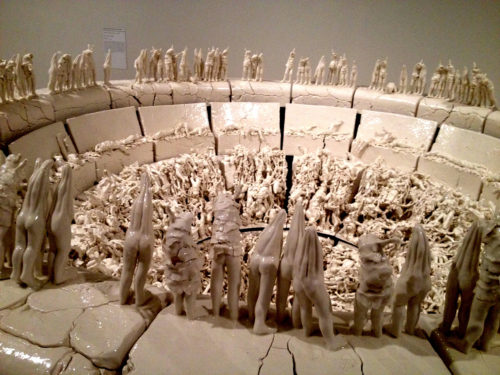
Rachel Kneebone
This notion was given a popular expression by Conan Doyle via Sherlock Holmes. Yates notes that Cicero wrote much on the subject and that there are texts from now forgotten teachers on this subject that were in use through the middle ages. The germane point here is the importance of space. A ritual allegorical space of the mind. What was referred to as *artificial memory*. And in one sense, then, theatre can be seen as the outward projection of this.
“The artificial memory is established from places and images (Constat igitur artificiosa memoria ex locis et imaginibus), the stock definition to be forever repeated down the ages. A locus is a place easily grasped by the memory, such as a house, an intercolumnar space, a corner, an arch, or the like. Images are forms, marks or simulacra (formae, notae, simulacra) of what we wish to remember. For instance if we wish to recall the genus of a horse, of a lion, of an eagle, we must place their images on definite loci.”
Frances Yates

Visitor Center, Sparrenburg Castle. (Max Dudler, architect.)
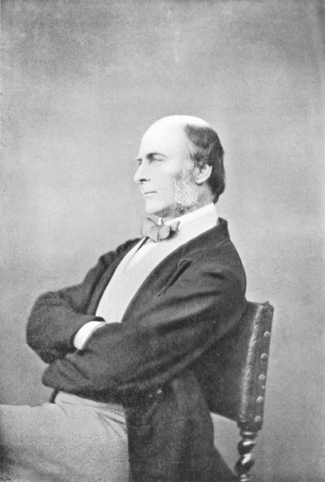
Francis Galton (age 50).
“Benjamin is always more interested in what he calls, after Proust, involuntary memory, which rejects the conscious application of subjective meanings upon the range of experiences presented to consciousness. Involuntary memory provides an unexpected shocking link between a concrete experience in the present and its cognate in the past. It is a deliverance from temporality. It produces a shock, a waking up, albeit to the power of something like a dream.”
Esther Leslie
Leslie remains perhaps among the two or three best readers of Benjamin. And one of her most cogent observations is to remind the reader that Benjamin was not some apolitical and isolated lonely genius, but rather an engaged Marxist who never abandoned a quest out of the nightmare of Capitalist society. For so many, there is always the emphasis on Benjamin’s reluctance to embrace Stalinism. But he also never spoke or wrote of it (or very little). He felt that to mention the problems associated with communism was automatically to privilege capitalism. For the planet was Capital itself. The Soviet Union was the last bulwark against the hegemony of mass exploitation. Communism was never fascism. And so memory must not only remember itself, it must remember things that it cannot say. And form, as Adorno continued to emphasize, loomed as the negation of an aesthetics of domination and subjection. Of administration. Memory, as for Cicero and Giordano Bruno, was both artificial and productive. And simultaneously was never disconnected from history. Today in the aftermath of the most specious and absurdist political spectacle perhaps ever, the sense of pretend-memory feels very acute. The public do not have memories, they have cinematic loops manufactured partly by short terms screen memory, but more by the assemblage of fragmentary linking of vague words to vague(r) images. In other words nothing is *being remembered*, except an obligation to fill in the blank zone where memory once was. There is a general idea of a memory image and that is pasted on the paint by number space it has been assigned, in the subject. It reminds me of Big Julie in Guys and Dolls who explains to Nathan Detroit, while he holds up dice with no markings on them…
Nathan: I do not wish to seem petty, but may I have a look at those dice? But these dice ain’t got no spots on ’em. They’re blank.
Big Julie: I had the spots removed for luck. But I remember where the spots formerly were.
The public remember where the memories formerly were. Except now they don’t even do that.
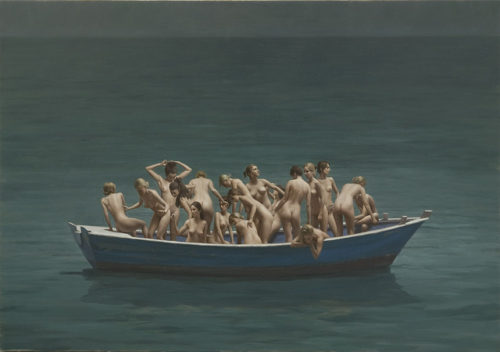
Harry Holland
The shift toward calculus in social relations that intensified in the 70s and 80s was set in motion in a sense by Truman and Churchill immediately after WW2. The famous Iron Curtain speech by Eugenicist Churchill, and the formation of the National Security State by Truman. Flash forward to the 80s and the Bernays culture was suddenly being heavily medicated. But while the Puritanical and racist hysteria of media focused on illegal street drugs, the real mass chemical warehousing was taking place in the Bourgeois class. Prozac nation. It is possible that the 80s appears in the rear view mirror as the last moment of non narcotized memory formation (never mind it is a false memory today, that’s actually not the point). The phantasmic properties of the commodity are paradoxically, perhaps anyway, nullified by their endless ongoing standardization. And simply adding new brand names has begun to actually instill a kind of subclinical fear and unease in the consumer. It is a breaking point for no longer do people remember where the meanings formerly were. And those forgotten meanings were illusory to begin with. The advertising sensibility of the 80s was one in which commodities were meant to promise future happiness. Today the emphasis is on the past, a nostalgic past of fantasy. And yet, in theory the next step in the marketing logic at work is that consumers will project this amber glowed nostalgic past into, at least, the present. But I don’t think that is happening. People increasingly live in what I called once a *dead now*. Only this *dead now* no longer squelches anxiety. The increasing brutality of daily life, especially for the poor, is simply and literally not seen by the white affluent class. Those blank smiling faces at the Democratic Convention, nominating a ghoulish reptilian horror figure, a Mother from Purgatory — the escapee from Dracula’s Castle, and her increasingly unwholesome and cadaverous husband, and former President — those people, those smiling masks are barely hiding a mental fatigue that no amount of anti-depressant and no number of gin & tonics is going to help. Meanwhile the working class, or certainly an increasing number of them, are beginning to snap to the fact that almost EVERYTHING they have been told is a lie. And that in fact the concept of the *lie* is itself an issue. What does that mean when the leaders of the free world (sic) lie more than they speak the truth. In fact they lie openly, in public speech, at around 90% of the time. What sort of society can this be?

Jacob and Wilhelm Grim Center, Berlin (Max Dudler architect).
*Afflicted Powers* (Iain Boal, T.J. Clark et al.) wrote that “Once upon a time what commodities promised was a future…{} Now a whole dominant class of them exist to invent a history”. This was written in 2005.
Still, the question is memory, like most things, entails a class analysis. The Victorian era, as Forte astutely notes, was a period of coalescing — Capitalist expansion, the colonial project that began a hundred or so years before as the expression of that, came together in English culture of that period. For as vicious as French and German and Dutch colonialists were, it was the English that defined the culture of colonialism. And it should be noted that the U.S. borrowed heavily (obviously) from the English. Notions of masculine etiquette and white superiority were vastly more pronounced in English society than in the rest of Europe. The Eugenics movement derived much impetus from Germany, but it was really the U.S. and England that pushed a vision of a white future, a future of superior stock and natural health and intelligence. It was the English that saw Eugenics in the light of Utopian futures. For the Americans, the scientific rationality felt pragmatic more than anything else. For the Germans it was a bit of both, but additionally there was a more folk (or volkish) mythology attached. Still, this was a century of still acute Utopian dreams. The Utopia was tainted and toxic, to be sure, and built, even in the imagination, by slaves, but it was forward moving. This encapsulated and bureaucratized the ideal of *progress*. The dream of Eugenics was a white world, and this was carried further by Hitler and the Nazi Party as a global cleansing project. But as today, the dark skinned, the infirm, the Jew and the Communist, were the scapegoats. The white liberals defending their vote for Hillary are almost to a man/woman anti socialist and anti communist. I would argue 99.9% are profoundly hostile to the very idea of communism. For solidarity and cooperation are not really factors in the preservation of this Victorian dream that they unconsciously, mostly, cling to. Neo liberalism, in the person of Hillary Clinton, coincides perfectly with this new neo-Victorian fantasy. It runs alongside the new Eugenics of Bill Gates and the pseudo pragmatism of Obama’s education program. A program or project that is very much about making judgements on the usefulness or lack thereof of American students.
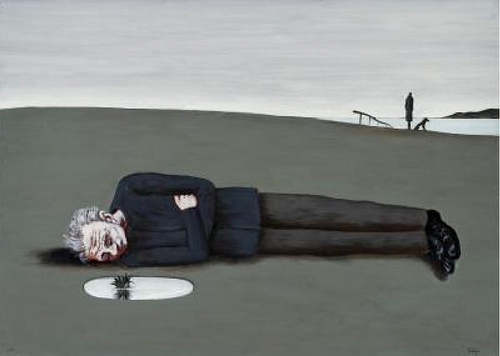
Viktor Pivovarov
The rise in Eugenics as a science exploded in the first decade of the 20th century. The focus was on what was called *race hygiene*. Among those deemed unfit to reproduce were epileptics, beggers, criminals and those who refuse to work. And of course much of this became subsequently coded as anyone not white. It is interesting that there were regional differences in philosophy, again. The French wanted to make sure birth rates remained high (so as not to be outnumbered by their German neighbors). While the Protestant north, in Holland and Scandinavia, the emphasis was on negative measures to isolate the infirm from the rest of society, lest their genes mingle (i.e. sterilization). The concern for American and British Eugenicists was both to keep a scientific legitimacy while at the same time imparting their societal reformist agenda. The Americans were always fond of horse breeding metaphors. One of the ironies of the international movement was that the outbreak of the first world war actually helped to end cooperation among Eugenicists of different countries. The point here, though, is that the Victorian sensibility was one of domination. And the employment of science (sic) to help with that domination. It was England that saw the need for keeping track of the poor lest they infect the population of their betters. The *white mind* was the best mind. And rational analysis (The Sherlock Holmes model again) was seen as mature, the product of evolutionary logic. Nature had provided the world with the British ruling class as the its ideal human. Especially the ruling class man. The British class system was reflected in the near obsessional concern with tiers of infirmity; a need for strict hierarchical classification.

H.C. Westermann
The current neo liberal vision is one that desperately needs to manufacture mythic enemies. The more contemporary society feels numbed, and without color or feeling, the more the ruling elite and their clerks and attendants will look to scapegoats. The fantasy of progress, which came into full bloom in Victorian times, was kitschified in post WW2 America. Progress was Epcot Center and managed leisure time. Gadgets which exploded in the digital era along with information technology. Progress. Except for some reason there was an accompanying rise in the prescription of anti depressants and mood elevators. Most Americans can’t find Iraq on a map but they know what a serotonin reuptake inhibitor is. Screen life distanced real life. And the cost, or one of the costs of that distance was the destruction of both dreaming and memory. The white overlords of Empire were suddenly resembling sniveling neurotics with falling sperm counts. The erosion of memory skills has meant the loss of a subjectivity that can sustain allegory. And the current output of corporate culture suggests near total imaginative failure. The recirculation of earlier failures is almost expected, now. And this repetition mirrors the compulsive repetitive language of the leadership class. The heightened fear of Donald Trump has many aspects, but among them is his obvious lack of fecundity, his limited virility. And as such he is a horrible reflection of the bourgeoise’s own fears. And yet, to his followers this doesn’t matter. I don’t believe they really think he is an alpha dog, but they don’t care. They don’t care because their anger is such that any rejection of the affluent overlords of the system is going to be embraced. The pre-existing scapegoats of minorities and women and immigrants is a way to not actually face their own fears, their own doubts. For doubt haunts modernity right now. The bourgeois class knows, or senses, deep down that their privilege is waning. The working class, mostly without work, and certainly without work that provides any dignity, knows all this too. Or they sense it. The underclass knows they are disposable.
The new marketing of Eugenics has taken the form of *population fear*. Its green eugenics. There is a real need today to ideologically deconstruct the genuine environmental crisis from the rising justification in liberal circles for mass control. The substitution of some global or planetary imagery (new age mother earth stuff) for what is really still a Western caste system is highly pernicious. Defending the status quo is defending the themes of social management based on the terms of the white Empire.

Kirstine Roepstorff
The loss of psychological space, the erosion of memory has meant a society, a culture of not caring. And because this new form of modernity doesn’t care, there is an equal need to advertise that they do care. Caring now comes in the form of responsibility. Liberal guilt is not really guilt. It is liberal annulment of self. But the rhetoric is rife with proclamations of concern. The American public are like goldfish in a bowl they continue to bang into but forget 7 seconds later. As social unrest increases, the bourgeoisie in the U.S. will for certain side with the apparatus of control. The justification for Hillary Clinton will easily slide over into justification for bombing Syria, and for Israeli colonial practice — the new annihilationists. The domestic police departments have studied with the Israeli military. That a huge proportion of american police departments include Klan members will pass unnoticed, as does the massive use of steroids by city cops. Prisons will grow, not get smaller. If one is so indoctrinated that the contradictions and cognitive dissonance of the Democratic Convention can be ignored — employing this mild form of lesser evilism (I say milder because while it began that way, the current embrace of Hillary doesn’t even feel the need) then anything can be tolerated to hold onto privilege.
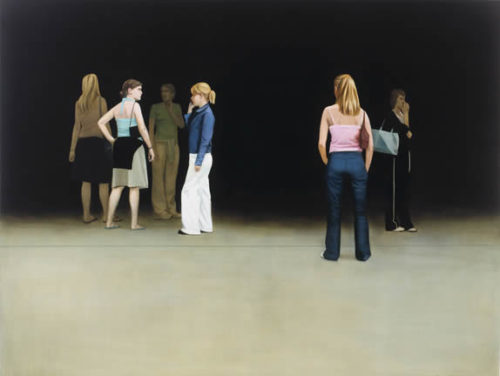
Tim Eitel
Quoting Afflicted Powers again….“A new round of technical innovation has made alienation into a realm of images, a pervasive, banal, constantly self administered reality.”
The disenchantment of society is part of the fall out from this loss of memory skills, a shrinkage of inner life altogether, and the atrophy of mimetic capability. The distancing, or really prohibition of Nature. The enclosure of life into small cubicles of digital unreality. There are no commons, only non spaces. There is little remaining access to land and water and just space. The experience of empty space is a crucial aspect of aesthetics. And by extension of culture. The U.S. project is one of curtailing culture. Culture is Hollywood’s supine submission to militarism and corporate ideology. Culture is the 4th grade level speech, both in content and execution, of Chelsea Clinton at the end of the convention. The awkward fixed smiles of the liberal followers displayed nothing so much as an inner numbness. The theatre of the mind that Cicero knew, and Kafka and Bruno and Shakespeare, that Dante knew and which drove the buildings of much early modernist architecture — from Barragan to Wang Shu today — is now an architecture of amnesia. The kitsch violence of Hadid’s non spaces. In culture today movement is directionless because you cant have directions to nowhere. The supporters of this system are suffering the cost of such massive forgetting and denial. If you bomb children in Gaza and it fails to register then you have lost something of what it means to be human. You are likely unable to then know yourself in any functional way. I am sure there will be a film soon with a Zombie protagonist (well, there is in a sense with iZombie) because that is who manufactures this junk. Zombies. And they reproduce what they know of themselves. Zombies have moved from metaphors for the dangerous masses to cute spunky bloodsuckers integrated seamlessly into the system. That the girl zombie of iZombie works for law enforcement is hardly an accident.

Tragic, terrifying and true.
These Clintons are trash, proof that those law schools and Oxford and Yale, what rotting schools, what rotten educators (sic).
“You can’t say you love your country and hate your government.” – Bill Clinton, 1995 (After the OKC bombing)
“A lot of wonderful people love their country and hate the military.” – Bill Clinton, 1969 (Letter to the National Guard)
“The other thing we have to do is to take seriously the role in this problem of…older men who prey on underage women…There are consequences to decisions and…one way or the other, people always wind up being held accountable.” Bill Clinton, June 13, 1996, in a speech endorsing a national effort against teen pregnancy.
From Time magazine. 6/17/96 p. 104 refers to “Juanita” a recently discovered Inca mummy:
“You know, if I were a single man, I might ask that mummy out. That’s a good-looking mummy!”—Bill Clinton
“African-Americans watch the same news at night that ordinary Americans do.”
President Clinton on Black Entertainment Television, November 2, 1994
Mrs. Clinton:
Regarding her husband’s antics with hideous women like Paula Jones and Monica Lewinsky, Hillary scoffed at the notion that these accusations would be taken seriously:
“Who is going to find out? These women are trash. Nobody’s going to believe them.”
Apparently Hillary doesn’t realize that just because many kids can’t get a job, it doesn’t mean that they don’t want to. However, she persisted in this belief during her 2008 campaign:
“We have a lot of kids who don’t know what work means. They think work is a four-letter word.”
“The American people are tired of liars and people who pretend to be something they’re not.”
“If I didn’t kick his ass every day, he wouldn’t be worth anything.”
“I have to confess that it’s crossed my mind that you could not be a Republican and a Christian.”
Brian Williams isn’t the only major public figure who made up colossal whoppers about being under enemy fire overseas. In this 2008 anecdote, Hillary recalls an event that didn’t happen during a trip to Bosnia in 1994.
“I remember landing under sniper fire.”
Hillary took strong exception to news media demanding paperwork regarding Whitewater and Bill’s various affairs.
“I’m not going to have some reporters pawing through our papers. We are the president.”
“I have to admit that a good deal of what my husband and I have learned [about Islam] has come from our daughter.” (TruthInMedia.org 8/8/1999 – Hillary at a White House function, proudly tells some Muslim groups she is gaining a greater appreciation of Islam because Chelsea was then taking a class on the religion).
F**k off! It’s enough that I have to see you shit-kickers every day, I’m not going to talk to you too!! Just do your G*damn job and keep your mouth shut.” (From the book “American Evita” by Christopher Anderson, p. 90 – Hillary to her State Trooper bodyguards after one of them greeted her with “Good morning.”
“You f**king idiot.” (From the book “Crossfire” p. 84 – Hillary to a State Trooper who was driving her to an event.)
“If you want to remain on this detail, get your f**king ass over here and grab those bags!” (From the book “The First Partner” p. 259 – Hillary to a Secret Service Agent who was reluctant to carry her luggage because he wanted to keep his hands free in case of an incident.)
“Get f**ked! Get the f**k out of my way!!! Get out of my face!!!”(From the book “Hillary’s Scheme” p. 89 – Hillary’s various comments to her Secret Service detail agents.)
“Stay the f**k back, stay the f**k away from me! Don’t come within ten yards of me, or else! Just f**king do as I s ay, Okay!!!?” (From the book “Unlimited Access”, by Clinton FBI Agent in Charge, Gary Aldrige, p. 139 – Hillary screaming at her Secret Service detail.)
Fourth Graders, Indeed. Yale, Oxford, all the best and brightest lobbying, talking a bout the latest fashions, those junkets to Monaco, sure, these people to a tee, are trash, classless, amazing how boorish they are, Capitalists, from Sea to Shitty Sea:
Mr. First Black President, Billy-boy:
“African-Americans watch the same news at night that ordinary Americans do.”
President Clinton on Black Entertainment Television, November 2, 1994
From Time magazine. 6/17/96 p. 104, refers to “Juanita” a recently discovered Inca mummy: “You know, if I were a single man, I might ask that mummy out. That’s a good-looking mummy!”—Bill Clinton
“Almost makes you want to go to jail out here.” – Bill Clinton – after being told that famed Bellver Castle (Spain) once served as a prison as well as a palace for kings
“I am the only President in who knew something about agriculture when I got there.” (Bill Clinton, Washington Post, 4/26/95)
President Clinton was interviewed on January 21, 1998 by Jim Lehrer on his alleged affair with a White House intern and subsequent alleged subornation of her perjury. Clinton said, “I’m just trying to suppress my natural impulses and get back to work.”
You know the one thing that’s wrong with this country? Everyone gets a chance to have their fair say.” President William Clinton addressing the people of Philadelphia, May 28, 1993 in the Courtyard, City Hall, Philadelphia, PA. Someone in the audience who voiced an opinion, and that was Clinton’s response
You can’t say you love your country and hate your government.” – Bill Clinton, 1995 (After the OKC bombing)
“A lot of wonderful people love their country and hate the military.” – Bill Clinton, 1969 (Letter to the National Guard)
“The other thing we have to do is to take seriously the role in this problem of…older men who prey on underage women…There are consequences to decisions and…one way or the other, people always wind up being held accountable.” Bill Clinton, June 13, 1996, in a speech endorsing a national effort against teen pregnancy.
Now, the better half!
Mrs. Bill Clinton: “I have to admit that a good deal of what my husband and I have learned [about Islam] has come from our daughter.” 8/8/1999 – Hillary at a White House function,
F**k off! It’s enough that I have to see you shit-kickers every day, I’m not going to talk to you too!! Just do your G*damn job and keep your mouth shut.” (From the book “American Evita” by Christopher Anderson, p. 90 – Hillary to her State Trooper bodyguards after one of them greeted her with “Good morning.”
“You f**king idiot.” (From the book “Crossfire” p. 84 – Hillary to a State Trooper who was driving her to an event.)
“If you want to remain on this detail, get your f**king ass over here and grab those bags!” (From the book “The First Partner” p. 259 – Hillary to a Secret Service Agent who was reluctant to carry her luggage because he wanted to keep his hands free in case of an incident.)
“Get f**ked! Get the f**k out of my way!!! Get out of my face!!!”(From the book “Hillary’s Scheme” p. 89 – Hillary’s various comments to her Secret Service detail agents.)
“Stay the f**k back, stay the f**k away from me! Don’t come within ten yards of me, or else! Just f**king do as I s ay, Okay!!!?” (From the book “Unlimited Access”, by Clinton FBI Agent in Charge, Gary Aldrige, p. 139 – Hillary screaming at her Secret Service detail.)
“I remember landing under sniper fire. There was supposed to be some kind of a greeting ceremony at the airport, but instead we just ran with our heads down to get into the vehicles to get to our base.” — Hillary Clinton makes up story about her trip to Bosnia.
“In the four years since the inspectors left, intelligence reports show that Saddam Hussein has worked to rebuild his chemical and biological weapons stock, his missile delivery capability, and his nuclear program. He has also given aid, comfort, and sanctuary to terrorists, including Al Qaeda members, though there is apparently no evidence of his involvement in the terrible events of September 11, 2001. It is clear, however, that if left unchecked, Saddam Hussein will continue to increase his capacity to wage biological and chemical warfare, and will keep trying to develop nuclear weapons. Should he succeed in that endeavor, he could alter the political and security landscape of the Middle East, which as we know all too well affects American security.” — Hillary Clinton, October 10, 2002
“I have to admit that a good deal of what my husband and I have learned (about Islam) has come from my daughter. (As) some of you who are our friends know, she took a course last year in Islamic history.” – Hillary Clinton
“My husband may have his faults, but he has never lied to me.” — Hillary Clinton, in Kim Eisler’s Masters of the Game: Inside the World’s Most Powerful Law Firm
On her husband’s Paula Jones and Monica Lewinsky fun, Mrs. Bill scoffed at the notion that these accusations would be taken seriously: “Who is going to find out? These women are trash. Nobody’s going to believe them.”
How many kids can’t get a job, it doesn’t mean that they don’t want to. However, she persisted in this belief during her 2008 campaign: “We have a lot of kids who don’t know what work means. They think work is a four-letter word.”
“The American people are tired of liars and people who pretend to be something they’re not.”
Hillary on those political achievements if Billy-boy: “If I didn’t kick his ass every day, he wouldn’t be worth anything.”
Hillary took strong exception to news media demanding paperwork regarding Whitewater and Bill’s various affairs. “I’m not going to have some reporters pawing through our papers. We are the president.”